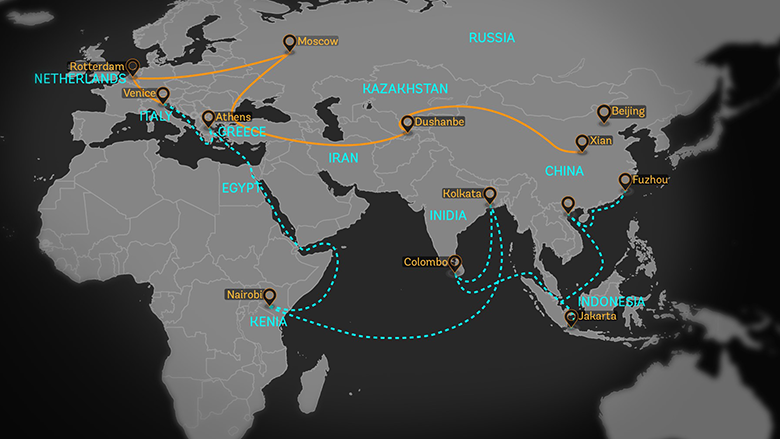The clarity and consistency of Chinese policies towards the world under President Xi Jinping’s government guided by the philosophy of “a global shared future” should inspire African countries to make decisions to align with China and follow its guidance towards prosperity.
At present, no single country or bloc is producing clear-cut policies and blueprints that are as revolutionary and all-encompassing, with demonstrable intent to unite the world on a path of development, in the manner that China is doing. The Belt and Road Initiative, which is an initiative for promoting international economic cooperation enunciated by President Xi in 2013, is a blueprint for nations of the world to promote development
policy synergy, infrastructure development, trade facilitation, financial cooperation and people-to- people bond.
It seeks to provide new drivers for global growth, offer new avenues and space for international economic cooperation, and create new opportunities for common development and shared prosperity.
It is inspired by, and built on, the concept of the ancient Silk Road that connected Asia to the world via trade routes and has thus become a sophisticated phenomenon comprising of a synergy of economic corridors, networks of roads, railways, air routes, waterways, information highways and pipelines, as
well as multiple ports in various countries.
With over 144 countries and 32 global organisations part of the BRI, the initiative has grown a life and spirit of its own in just under a decade.
It represents the future, no doubt. Unlike other regimes, BRI is built on pillars of consultation and equality among nations; openness and
inclusivity of economic engagements and trade as well as sustainable development that is high-standard and people centred.
This makes it compelling for African countries not to dither but align with China and reap benefits of the new global order.
BRI – a review
A recently-released paper entitled, “Report on the Findings and Recommendations from the Meetings of the Advisory Council of the Belt and Road Forum for International Cooperation in 2019 and 2020”, explains the features of BRI and highlights a number of successes that it has achieved thus far.
It notes that: “By nurturing new cooperation platforms, exploring new cooperation approaches, promoting new initiatives, and embarking on new endeavors, Belt and Road cooperation is expected to deliver more concrete outcomes that will benefit its partners and contribute to a bright shared future
for the mankind.”
Some highlights of these successes and prospects under a comprehensive and complex framework include elevating multilateralism. New platforms for international cooperation have been developed to foster more coordinated efforts among partners. Under this arrangement, governments of partner
countries and other stakeholders work together to define common visions and approaches, identify common priorities and map out common course of actions in relation to Belt and Road cooperation.
The BRI has been enhanced by focus on narrower, high-impact scopes which has allowed the unrolling of programmes and actions that are practical and goal oriented. These include the health, green, digital and integrity “silk roads”. These, among other things, have seen the tackling of Covid-19 as the major
output of the health silk road incorporating multiple countries of the world and the success of the vaccine development and rollout.
Under the “green silk road” China is investing billions of dollars in green energy, undertaken to cut emissions and is cooperating with countries at multilateral and bilateral levels to undertake environmentally-sustainable initiatives.
The “digital silk road” has China collaborate with other countries in areas such as cloud computing, big data, Internet of Things and artificial intelligence (AI). Over the past two years, China advanced cooperation with countries across regions, including Africa to reap benefits from the digital era.
Lastly, China is building, along with countries of the world what is termed a “clean silk road” undergirded by a culture of integrity and fight against corruption, with a view to ensuring that Belt and Road cooperation can yield real benefits that are enjoyed by the people. China itself is a model for
efforts to combat corruption and graft, as it has demonstrable track record of publishing offenders.
China’s collaboration with partner countries to eliminate corruption is a revolutionary approach.
Focac meets BRI
What is remarkable about Chinese engagements with the world is its consistency and clarity.
In the various initiatives, cases, successes and highlights enumerated above, China has both global, regional and local adaptations or implementation frameworks that have seen it engage with various countries and agencies for the implementation of BRI projects.
It’s unsurprising that the Forum on China-Africa Cooperation (Focac) represents a framework for the domestication of BRI on the continent.
Notably, there are no contradictions between what China is doing globally with what it is doing in Africa. The outcomes of the 8 th Ministerial Conference of Focac, held in Dakar, Senegal, last year, tick all the boxes of BRI.
Given this consistency and the clarity undergirding China’s global policies and approaches seen in BRI, Africa – Zimbabwe included – need to fully commit to working with China for a better future for its people.
By Glen Chinyani
*Chinyani is a researcher with a local think tank
